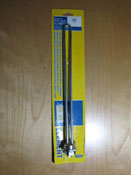 If you have determined that your water heate elements are bad, you are going to need to purchase new ones. There are a few things to keep in mind before you run to the hardware store or order online.
If you have determined that your water heate elements are bad, you are going to need to purchase new ones. There are a few things to keep in mind before you run to the hardware store or order online.
Not sure if your elements are bad? See the article, 'Electric Water Heater Element Testing' for information on how to check the elements.
Not sure if the elements are even the problem? See 'Troubleshooting Electric Water Heaters' or 'Gas Water Heater Troubleshooting' for a complete listing of problems and solutions.
Types of Hot Water Heater Elements
There are both 'high density' and 'low density' hot water heater elements. Low density elements are considered better, they last longer and are less prone to build up. The low density elements have more surface area and therefore do not need to get as hot.
Density has to do with the surface are of the heating element. Low density elements have more surface area. They are also coated and/or made from different materials to resist corrosion.
Low Density Elements
This type of element is made from copper with a magnesium oxide and nickel coating. This type of element provides more heating surface and is less prone to corrosion. Low density elements are a little more expensive than high density types. This style will have a screw type fitting to install it.
High Density Elements
This type is the least expensive and will likely be he type installed originally in your water heater. This type will come in either a screw type or flange type connection. High density elements are the most suceptible to corrosion and failure due to the high heat generated. This type is made from copper and may have a zinc coating.
Extra Low Density Elements
This type is the best element that you can get. Some of them come with a lifetime gaurantee. They are made from high grade stainless steel. They are less prone to build up and will not burn out. These are also the most expensive elements.
You may have trouble finding a low density element with a flange assembly. You can purchase an adapter kit to use a screw in type on a flanged set up. It's up to you. For a screw type element you should not have a problem finding either density. Of course the low density elements cost more. Did you think you would get something for nothing? It's not a lot, a few dollars more for the better one. Make your choice on the density thing, use the salesman in you need to. After that you are ready to get things back together.
Water Heater Element Wattage
The wattage on hot water heater elements can range from 1500 to 5500 watts. Wattage is determined by voltage so you want to match the voltage and wattage for your new elements.
The best place to find the wattage and voltage information is on the label that is attached to the side. You will usually see two wattage numbers for each element. A lower number and a higher one. The reason for this is the acceptable voltage range that the water heater will operate at.
Most homes in the United States are wired for 120/240 Volts, but the voltage can go as low as 208 volts. Since wattage is based on voltage, the lower number you see on the label is based on the minimum voltage requirement.
There may be a 'Total Connected Wattage' number on the label. If it matches the wattage for the individual elements it means that only one element at a time will heat on the water heater.
Heating Element Attachment Types
There are two types of attachment types for electric water heater elements. Most newer water heaters are threaded and screw into the side of the tank. You need a large wrench to remove and install this type.
Older water heaters may have a flange type element. The bolts are smaller, but there are more of them, usually four. Before you purchase new elements yuo want to make sure that you have the correct flange for your water heater.
What Is the Next Step?
If you are purchasing water heater elements you will likely need to install them. See the article on 'Installing Electric Water Heater Elements' for complete instructions.
This job will require that you shut down and drain the water heater. See 'Shutting Down and Electric Water Heater' for information on what is involved.

